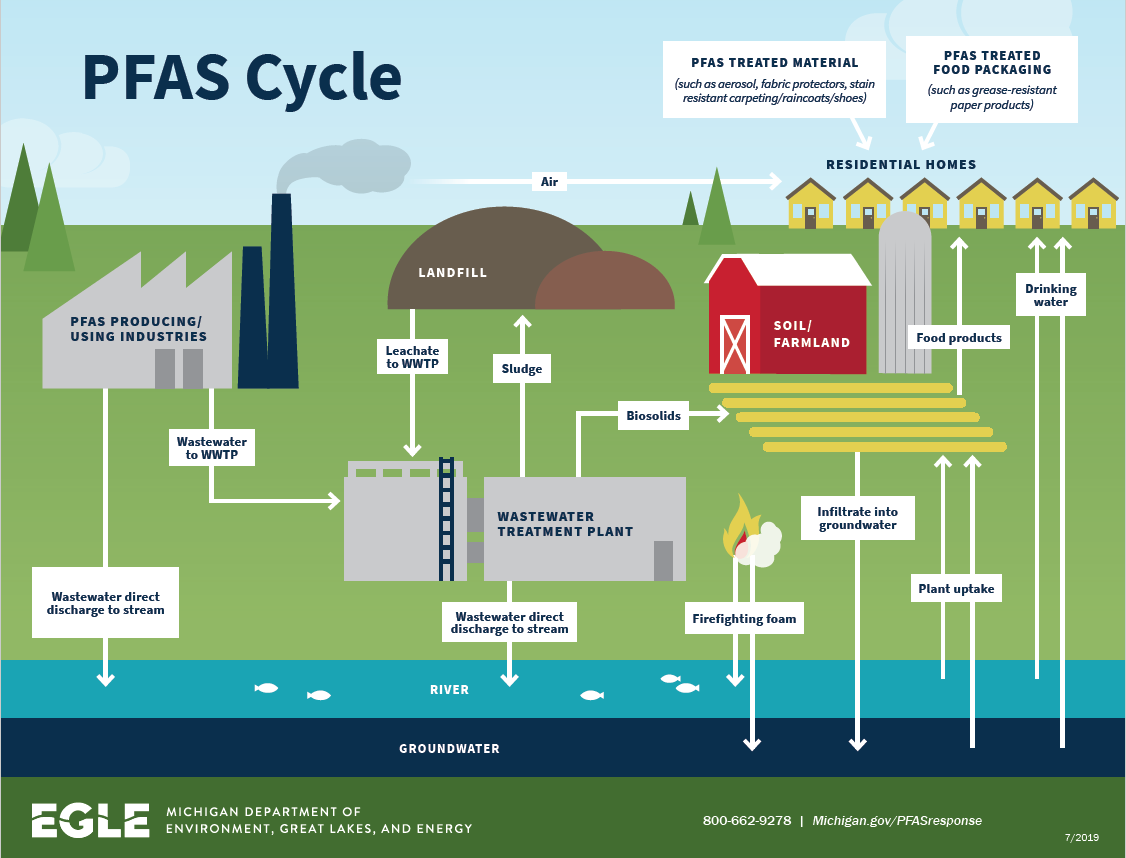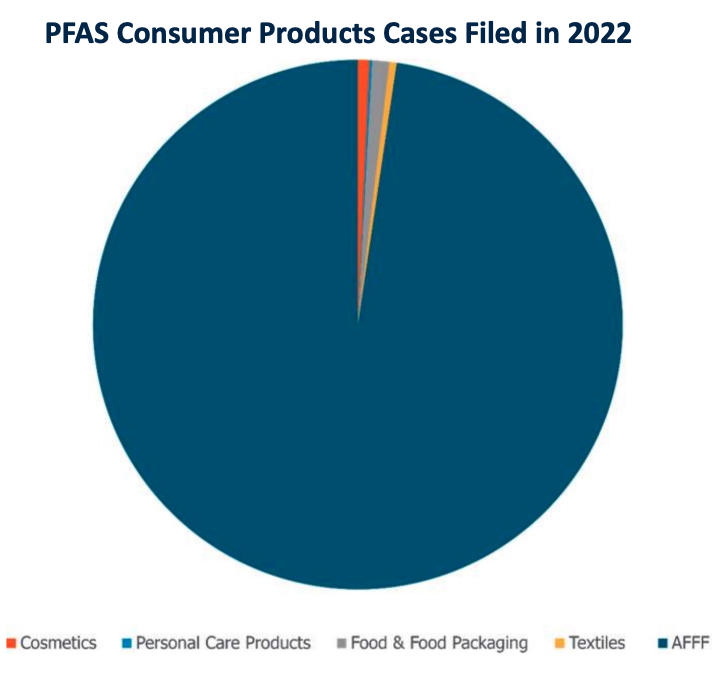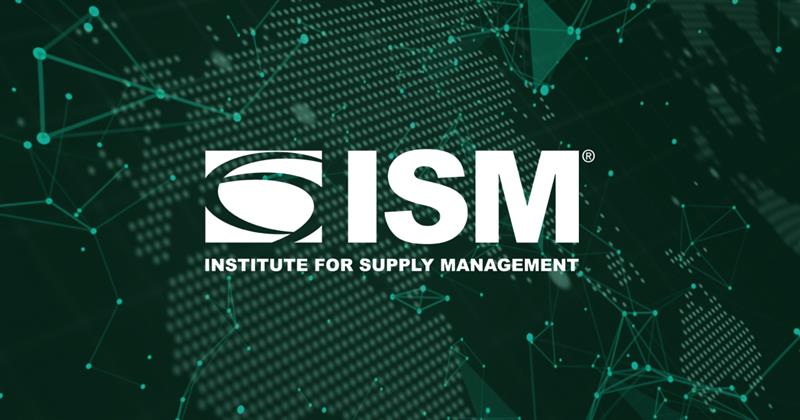[Updated October 2024]
As waves of lawsuits are filed against PFAS manufacturers like 3M and DuPont, businesses and consumers are raising questions about safety and health concerns. For decades PFAS chemicals have not only found their way into everyday home products, from skincare to clothes and cookware to carpet, but also into drinking water for entire cities. There’s another place where PFAS can be found, too—our supply chains.
Is PFAS in your supply chain, and should you be worried about your manufacturing supply chain resiliency? Stop wondering and learn what PFAS are, the most recent legislation against PFAS, and what your company can do to avoid PFAS-related risks.
What Are PFAS and Why Are They Dangerous?
According to the California Water Boards, PFAS are a group of approximately 12,000 synthetic chemicals that are used for numerous industrial and commercial processes. Many PFAS compounds have useful properties like making materials stain-resistant, water-repellant, heat-resistant, and nonstick—such as clothing and frying pans.
PFAS are used in manufacturing across various industries such as high-tech, automotive, aerospace and defense. For example, PFAS are used to manufacture semiconductors and EV batteries and make temperature resistant parts in planes and cars. Currently, the top PFAS-producing companies are 3M, AGC INC, Daikin Industries, Solvay, Arkema, and DuPont.
Between the 1960s and 1980s, 3M and DuPont started to study the implications of their PFAS chemicals and linked them to higher rates of health concerns among consumers and their workers according to the Evironmental Working Group. The ATSRD (or Agency for Toxic Substances and Disease Registry) states that these health concerns can range from a decreased vaccine response in children to an increased risk of cancer. Because PFAS were manufactured by scientists, they don’t exist naturally and cannot break down on their own. Thus, over the decades, PFAS have accumulated in our water, our soil, and our bodies.

Lawsuits Against PFAS
First let’s take a look at which lawsuits have been filed against companies who use PFAS. Lawsuits against PFAS pertain to four main categories of PFAS: Aqueous Film Forming Foam (AFFF), food packaging, textiles, and personal care products. As of April 2024, 30 US State Attorney Generals (AGs) have filed lawsuits against PFAS manufacturers for contaminating water supplies and other natural resources. Below is a snapshot of each type of PFAS, lawsuits against each type, and which products are affected:
#1 PFAS in Aqueous Film Forming Foam (AFFF)
As of October 2024, there are 9,896 active cases against PFAS manufacturers and their AFFF foams according to the Lawsuit Information Center. AFFF, or Aqueous film forming foam, is used to control petroleum-based fires. The main industries that use AFFF products include defense, petrochemical, and aerospace. A vast majority of the lawsuits in the United States filed against PFAS were filed against AFFF chemicals specifically. In June of 2023, lawsuits pertaining to water supply and soil contamination are being settled with payments from 3M close to 10 billion USD. This year in April, Tyco Fire Products, one of the companies that manufactured firefighting foam, settled the lawsuits against it for $750 million.
#2 PFAS in Food Packaging
The majority of lawsuits about PFAS in food packaging were filed in Illinois, California, and New York. Companies facing lawsuits include: Burger King Corp., Conagra Brands, Inc., Keurig, Dr. Pepper Inc., J.M. Smucker Company, and more. In 2022, class-action lawsuits were filed against McDonald’s and Burger King for allegedly selling food that can create dangerous health problems. Consumer Report conducted a test on numerous types of food packing, not just from McDonald’s and Burger King, and found PFAS chemicals in many papers used to wrap burgers, bags for fries, and containers for salads.
In February 2024, the FDA announced that manufacturers are no longer selling grease-proofing substances containing PFAS—used in fast-food wrappers, microwave popcorn bags, and pet food bags—for food contact in the United States. Some states have also passed legislation to ban PFAS in food packaging all together. In Hawaii, the ban takes effect in December 2024 and in Maine, the ban takes effect in January 2030.
#3 PFAS in Textiles
Many of the lawsuits against PFAS in textiles include allegations of misrepresentation of the product to consumers and the lack of warnings regarding the use of PFAS. A prime example is the French fabric producer Saint Gobain. According to the Guardian, in 2022, the company faced class action lawsuits for lying to regulators about the sheer amount of PFAS it uses during production and thus contaminating drinking water.
On August 30, 2024, 3M, Corteva, and Chemours were hit with a lawsuit in Minnesota for covering up the health risks of PFAS in carpets and rugs according to Reuters. There is also a proposed, nationwide class action lawsuit against 3M and other chemical makers for the use of PFAS in rugs, carpets, and other home textiles.
#4 PFAS in Personal Care, Skincare, and Makeup
Like textiles, most personal care product lawsuits are due to the lack of disclosure about PFAS in the products. Companies that are facing lawsuits for use of PFAS include Burt’s Bees, Bare Minerals, L’Oréal, and more. Researchers at the University of Notre Dame released a study that revealed half of the 231 products they test contained PFAS. The main culprits were waterproof mascaras and liquid lipsticks.

Legislation Against PFAS Chemicals
As more lawsuits are filed and more information comes out about the dangers of PFAS, legislation is proposed and, on some occasions, passed to regulate these man-made chemicals. Let’s look at current legislation against PFAS chemicals to help protect your manufacturing supply chain compliance.
According to Bloomberg Law, the European Chemical Agency (ECHA) proposed a PFAS restriction on February 7, 2023, as part of a plan to ban PFAS in Europe in 2025. This would affect the production and distribution of products containing PFAS chemicals. Companies that are affected by this restriction would have to redesign the construction of thousands of products. It is predicted that Europe’s proposed tighter regulations would influence more legislation in the United States, on state-wide and national levels.
In the United States, the EPA (Environmental Protection Agency) proposed legislation to categorize two PFAS chemicals, perfluorooctanoic acid (PFOA) and perfluorooctanesulfonic acid (PFOS), as hazardous substances. This would increase the transparency after events related to contamination, holding the polluters responsible for fixing their mistakes. The proposed law would obligate all firms to immediately notify national, state, and tribal response centers as well as emergency response commissioners right away of any PFOA and PFOS discharges equal or exceeding the allowed level.
Several states have already passed laws against PFAS including California, Colorado, Connecticut, Hawaii, Maine, Maryland, Minnesota, New York, Vermont, and Washington.
What are the Risks of PFAS in Your Supply Chain?
Companies must be vigilant in removing PFAS from their supply chains to protect manufacturing suppy chain compliance—especially as more legislation is passed limiting the use of PFAS. The main risks of PFAS come from increased ESG (Environmental and Social Governance) regulations and laws surrounding the use of PFAS.
The top industries that use PFAS include industrial equipment, automotive, construction, electrical and electronics, aerospace, semiconductor, and more. Product categories to watch out for due to upcoming regulations are carpets, fabric treatments, children’s products, cookware, cosmetics, food packaging, furniture, oil & gas, ski wax, and apparel.
Listen to our podcast to learn how to maintain manufacturing supply chain compliance by meeting regulatory and ESG compliance and staying up to date with PFAS legislation.
How to Remove PFAS from Your Supply Chain
Resilinc’s Multi-Tier Mapping helps companies identify suppliers that use PFAS in their supply chain. If a company finds PFAS in its supply chain, there are steps the company can take to limit its effect and maintain manufacturing supply chain compliance. First, companies should start to find replacement materials for PFAS. Next, companies should identify all PFAS used in production and which goods contain PFAS.
Currently, there are no perfect replacements for many PFAS, so each company will need to decide what capabilities of the chemical take precedence when a replacement is chosen. Possible replacements are alternative raw materials, bio-based materials, natural materials, hybrid materials, inorganic materials, and fluorine-free materials. To find a more accurate replacement, companies can start to plan research to develop a new product. This research process could take years to complete, so it is important to start as soon as possible.
Resilinc has mapped a total of 135 tier-1 suppliers that provide alternative raw materials to PFAS. With further development, raw materials can become alternatives to PFAS with similar qualities. As you find new products to replace the PFAS in your supply chain, you also need to increase your knowledge about your suppliers. To ensure PFAS regulations are being followed, create workflows with your supplier. At the same time, take this opportunity to increase communication with suppliers.
As manufacturing supply chain compliance regulations continue to rise, now is the time to learn how to improve your manufacturing supply chain resiliency.




